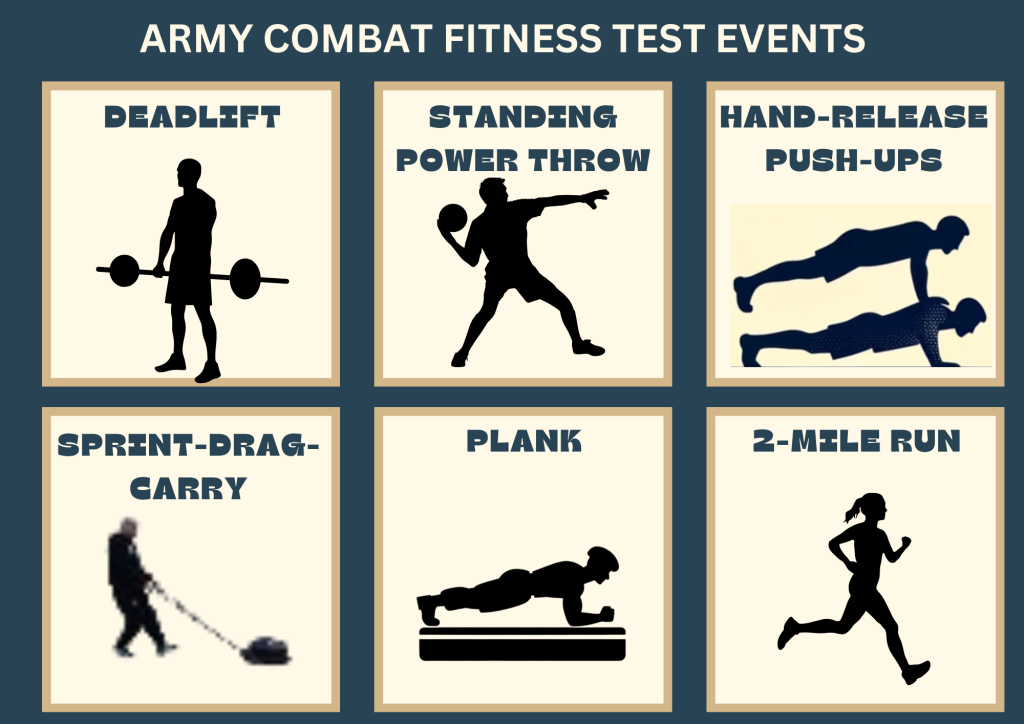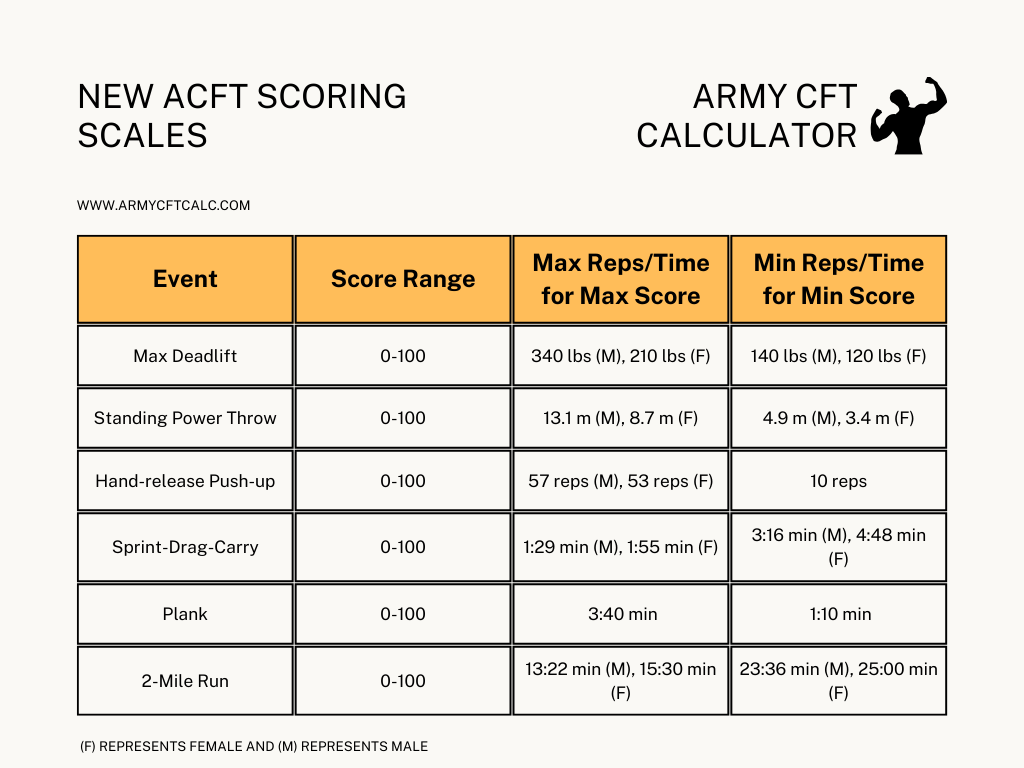Are you a soldier aiming to excel, or perhaps a civilian intrigued by the rigorous standards of military fitness? Either way, you cant afford to miss the inside scoop on ACFT standards, the game-changing metrics that are redefining what it means to be Army Strong. These arent your granddads push-ups and two-mile runs; the Army Combat Fitness Test (ACFT) is designed to rigorously evaluate the modern soldiers readiness for the complexities of the battlefield. From intense deadlifts to the adrenaline-pumping sprint-drag-carry, ACFT standards are crucial not just for promotions, but for optimizing your performance when it counts most. The clock is ticking, the stakes are high, and the ACFT is no longer an optionits a requirement. So read on to discover everything you need to know about these critical standards and take the first step toward acing your ACFT.
What is the ACFT?
The Army Combat Fitness Test (ACFT) is a comprehensive physical fitness assessment that has been designed to evaluate the strength, power, endurance, and overall physical readiness of soldiers. Created to replace the outdated Army Physical Fitness Test (APFT), the ACFT is geared to better prepare soldiers for the physical demands of modern warfare.
The ACFT aims to provide a balanced, holistic measure of a soldiers fitness level, focusing on aspects crucial for effective combat performance. The test not only measures basic fitness but also gauges a soldiers capacity to carry out common military tasks like lifting heavy equipment or carrying a wounded comrade. The objectives include:
- Assess Overall Fitness: It gives a rounded picture of a soldiers physical abilities, which helps in training and assignment placements.
- Enhance Soldier Readiness: With a comprehensive set of exercises, it prepares soldiers for the wide range of physical activities they might encounter in combat.
- Reduce Injury Rates: A better focus on functional fitness is aimed to lower the rates of injuries sustained during service.
In todays ever-evolving combat scenarios, mere strength is not enough. Agility, endurance, and a host of other physical capabilities are equally important. The ACFT brings these elements into the Armys physical training regimen. Preparing for the ACFT involves multiple aspects of fitness, ensuring that a soldier is well-rounded in terms of physical readiness. Dont forget to explore this guide about the New Army APFT Standards.
ACFT Standards
Regarding ACFT standards, the Army is very specific about what they expect from each soldier. These standards are tailored not just to gauge physical abilities, but also to ensure that soldiers are capable of handling the tasks and challenges theyll encounter in the field.
The ACFT scoring system is scaled and gender-neutral, ranging from 0 to 600 points. Each of the six events has its own maximum point allocation, and meeting minimum standards is necessary for different Army career fields.
The minimum and maximum scores for each ACFT event (for males aged 17-21) are as follows:
- 3RM Maximum Deadlift: Min: 140lbs, Max: 340lbs
- Standing Power Throw: Min: 6m, Max: 12.6m
- Hand-Release Push-Up: Min: 10, Max: 57
- Sprint-Drag-Carry: Min: 2:28, Max: 1:29
- Plank hold: Min: 1:30, Max: 3:40
- 2-Mile Run: Min: 22:00, Max: 13:22
Use the ACFT calculator to get a more customized score based on your gender and age group.
Your total score is the sum of your points from each of the six events. A minimum score is required for each event, with failing any single event resulting in a failure of the entire test.
Scoring in the ACFT is not just a measure of raw strength or speed but a comprehensive reflection of a soldiers physical readiness for combat. High scores in each event indicate a balanced, versatile skill set, essential for modern military operations.
A poor score in one area can reveal weaknesses that may need focused training. For instance, a low score in the Plank might indicate that you need to work on your core strength, which is crucial for overall physical performance.
Wondering how the ACFT measures up to other Army fitness evaluations? Dive deeper by checking out our guide on OPAT Army Standards to get a full picture of what the Army expects from you physically.
Army Combat Fitness Test Events

The ACFT is composed of six events that test different facets of physical fitness. Each event has been scientifically vetted to correlate with various combat-related tasks.
Deadlift
- Objective: To measure lower-body and upper-body strength.
- Execution: Perform a three-repetition deadlift with increasing weight.
- Relevance: Replicates lifting heavy equipment or a fellow soldier.
Standing Power Throw
- Objective: To assess explosive power and coordination.
- Execution: Throw a 10-pound medicine ball over the head and behind the body.
- Relevance: Similar to actions like vaulting over an obstacle or throwing equipment over a barrier.
Hand-Release Push-Ups
- Objective: To gauge upper-body endurance and strength.
- Execution: Perform as many hand-release push-ups as possible in a set time.
- Relevance: Relates to actions like pushing an enemy away during hand-to-hand combat.
Sprint-Drag-Carry
- Objective: To measure speed, strength, and agility.
- Execution: Complete a series of sprints, drags, and carries over a 50-meter course.
- Relevance: Mimics the activities involved in reacting quickly under fire, dragging an injured comrade, and carrying ammunition.
Plank
- Objective: To assess core strength.
- Execution: Maintain a plank position for a specified period.
- Relevance: Core strength is essential for virtually all military tasks, from lifting to running.
2-mile run
- Objective: To evaluate aerobic endurance.
- Execution: Complete a 2-mile run as quickly as possible.
- Relevance: Long-distance running stamina is crucial for situations like moving quickly from one position to another in the battlefield.
Holistic Health and Fitness
In modern military training, the concept of holistic health has gained immense importance. Its not just about how much you can lift or how fast you can run, its also about your emotional stability, mental clarity, and nutritional well-being. To understand how the Army is implementing these ideas, you can explore more about Holistic Health and Fitness (H2F).
Holistic health prepares you for the unpredictable challenges of the battlefield. A well-rounded soldier is not just physically strong but also mentally and emotionally resilient, capable of making sound decisions under pressure.
The rigors of Army life require a stable mental and emotional state. Simple techniques like mindfulness, meditation, and stress management exercises can make a world of difference.
You cant perform at your best if youre not fueling your body properly. Nutrition plays a crucial role in how quickly you recover from your workouts and how much energy you have on the day of your ACFT.
Develop Comprehensive Fitness
Start by setting S.M.A.R.T (Specific, Measurable, Achievable, Relevant, Time-bound) goals. This helps you stay on track and motivated.
Break down your larger goals into smaller milestones to make your journey more manageable and less overwhelming.
Your training program should include strength training, aerobic exercises, and flexibility workouts. This prepares you for the diverse requirements of the ACFT.
Endurance Training
Having a high level of aerobic endurance can greatly improve your overall ACFT score. Its not just for the 2-mile run; it also helps in events like the Sprint-Drag-Carry.
Methods to Improve Your Endurance
- Interval Running
- Cross-Training
- Long Slow Distances (LSD)
Improved endurance will help you perform better in almost all ACFT events. The benefits go beyond just the 2-mile run and could be the difference between passing and failing.
Conclusion
ACFT standards are meticulously designed to measure the comprehensive fitness level required for modern military operations. Meeting or exceeding these standards is not just about passing a test; its about being fully prepared for the demands of your role in the Army.
Physical strength alone is not sufficient in todays Army; comprehensive fitness is key. This includes mental, emotional, and nutritional well-being.
Train smart, eat right, and pay attention to your mental and emotional health. And remember, consistency is your biggest ally.
References





